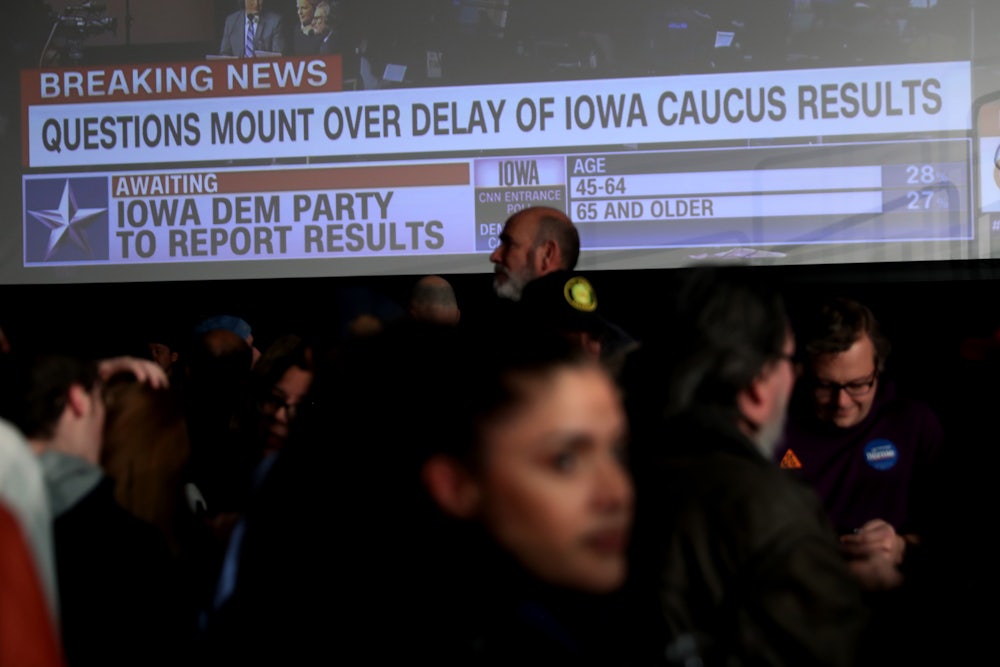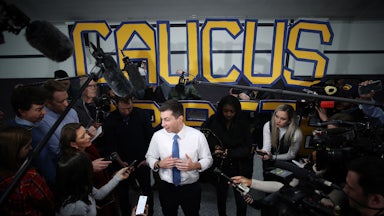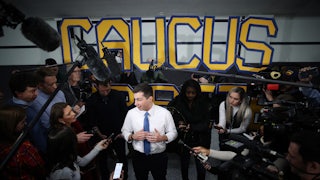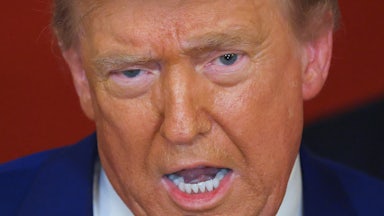The Democratic Party is finally going to give Iowa the boot. It’s high time. The 2020 caucuses, you’ll recall, were a mess. A kludgy vote-counting app was at the heart of the problem, and things were so screwed up that the results of the February 3 caucus weren’t made official until February 27, depriving the winner of any momentum. And who won, by the way? Even that wasn’t clear. Bernie Sanders won the popular vote, but Pete Buttigieg won the most “state delegate equivalents,” whatever they are.
The train wreck gave Democrats the excuse they needed to dump the caucus from the primary calendar, which I might have hoped would lead to a broader rethinking of the whole process. Iowa and New Hampshire, both around 90 percent white, are ridiculous states in which to start the nominating process of a party that is now roughly 55 percent white, 20 percent Black, 15 percent Hispanic, and 10 percent Asian.
It’s not just a demographic question. Democrats should start with a state that meets two other criteria: one, it should be an important state when November comes around; and two, it should be geographically diverse, with large cities, rural farm country, and everything in between. The presence of a large city would seem to be a must because cities are where the party’s base begins. Having to campaign for months on end in a state with at least one major city means that the contenders will be talking more about issues of concern to Democrats all over the country instead of pledging to sustain ridiculous ethanol subsidies like they did in Iowa.
This is a chance to really shake up the calendar, modernize the process, make it more relevant to younger voters: all that. Very exciting! Except that now, it seems that the new first state is going to be … New Hampshire. What?
According to Politico, Democratic insiders are leaning toward making the New Hampshire primary first. This is really dumb. It is true that New Hampshire is competitive in November, but that’s the only thing it has going for it. Its largest city, Manchester, has a population of 115,000; the greater metro area has around 420,000, ranking it 129th, just a tick ahead of Fort Wayne, Indiana.
This has Nevadans pretty steamed, and I don’t blame them. Nevada is a much better choice for a first primary. It ticks every box. First, check out these demographics: white/non-Hispanic, 48 percent; Hispanic, 29 percent; Black, 10 percent; Asian/other, around 11 percent. Two, its six electoral votes are competitive in general elections; Joe Biden beat Donald Trump by 2.4 percent there. Three, it has a major city in Las Vegas—a weird and tacky city that I personally kind of hate, but you can’t deny that it’s a large city. It also has a powerful union presence, which definitely ought to be more important to the Democratic Party than it appears to be.
Nevada would be fine as a first state. But if I could wave a magic wand, I’d make it Michigan. That’s a state that’s diverse in every way and isn’t just important in November—it’s crucial. It’s a little light in terms of Hispanic and Asian populations, so that’s a bit of a problem. But they do exist, and it’s just an obviously important state.
Think about how early primaries work. Candidates spend months retail campaigning in those states. They visit every corner of the place and really get to know it and get to know the key players there. That can matter in November. Now if Joe Biden runs, this becomes less important because he’ll be the nominee and no one will challenge him, or at least no one of any heft. But if he does not run for some reason, then you’d have 15 or so Democrats busing from Detroit to Ann Arbor to Lansing to Grand Rapids to Traverse City. And because it’s an industrial and urbanized state, they’d be talking about things that really matter in a general election: wages, health care, unions, racial justice issues, and so on.
If it’s New Hampshire, those candidates would still be talking about those things, I guess, but they’d be talking about them to a whiter and older and much more rural electorate. The whole framing of the race would be different in New Hampshire, and by different I of course mean worse.
Let me put it this way. If Biden doesn’t run in 2024, what kind of candidate would you rather send into battle against Donald Trump: someone who got about 75,000 votes in a heavily white and Republican-leaning tiny state or someone who got upward of 800,000 votes in racially diverse and (barely) Democratic-leaning state? It’s not remotely a close call.
So, to me, a state like Michigan should be first. Or maybe even Florida. Or Arizona or Georgia. To those who say big states are too expensive for also-ran candidates, I retort that these days, candidates with real grassroots support can raise millions online, more than they even know what to do with, as we’ve recently seen in some Senate races. So that’s no longer an issue. But it sounds like the party lacks the guts and imagination to truly shake things up, in which case Nevada will do.
But seriously—New Hampshire? The New Hampshire primary is a relic of an earlier time in American, and specifically Democratic, politics. DNC Chair Jaime Harrison could acknowledge this and do something that would add a little excitement to the process and stand a chance of catching the interest of younger voters—Generation Z may make up nearly 20 percent of the electorate in 2024, and they’re more heavily Democratic than any generation in history, but they’re also pretty disengaged right now, and you’d think the party would want to do things to engage them. Anointing New Hampshire the most important electoral state in the country? That ain’t it.










